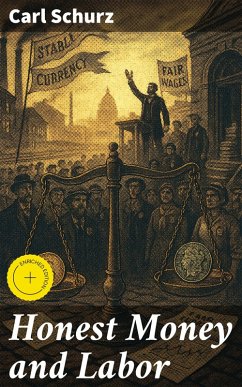
Gulmore, the Boss (eBook, ePUB)
Ambition, Corruption, and Power in Gritty Corporate America
Versandkostenfrei!
Sofort per Download lieferbar
1,99 €
inkl. MwSt.
Weitere Ausgaben:

PAYBACK Punkte
0 °P sammeln!
In "Gulmore, the Boss," Frank Harris presents a compelling narrative exploring themes of power, ambition, and moral complexity within the framework of early 20th-century American society. Through Harris's distinctive blend of realism and vivid characterizations, the novel immerses readers in the bustling world of business and personal conflict. The prose is characterized by its dynamic dialogue and sharp observations, reflecting Harris's journalistic background and his deep understanding of the human psyche. Set against the backdrop of industrial America, the book provides keen insights into t...
In "Gulmore, the Boss," Frank Harris presents a compelling narrative exploring themes of power, ambition, and moral complexity within the framework of early 20th-century American society. Through Harris's distinctive blend of realism and vivid characterizations, the novel immerses readers in the bustling world of business and personal conflict. The prose is characterized by its dynamic dialogue and sharp observations, reflecting Harris's journalistic background and his deep understanding of the human psyche. Set against the backdrop of industrial America, the book provides keen insights into the social and economic transformations of the era, rendering it a significant contribution to the literary canon of the time. Frank Harris, an esteemed writer and editor, was known for his controversial opinions and unfiltered perspectives on modern life, as evident in his autobiographical works and his role in shaping early 20th-century journalism. His vast experience in the literary scene, combined with his intimate knowledge of the cultural and social issues of his day, informs the character-driven narrative of "Gulmore, the Boss." Harris'Äôs encounters with influential figures likely inspired the complex portrayals of ambition and moral ambiguity, as he often critiqued societal norms and expectations. Readers seeking a profound exploration of the intricacies of leadership and its moral repercussions will find "Gulmore, the Boss" an essential read. Harris's engaging storytelling invites reflection on contemporary power dynamics, making it relevant for modern audiences. This novel not only entertains but serves as a mirror to our understanding of authority and ethics in both personal and professional realms.
Dieser Download kann aus rechtlichen Gründen nur mit Rechnungsadresse in A, B, BG, CY, CZ, D, DK, EW, E, FIN, F, GR, H, IRL, I, LT, L, LR, M, NL, PL, P, R, S, SLO, SK ausgeliefert werden.













